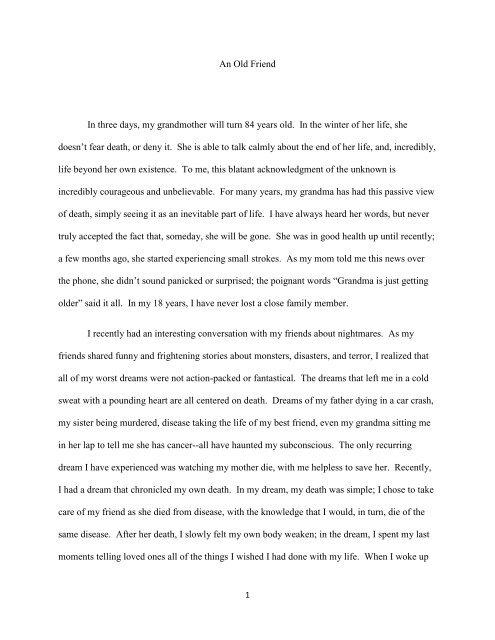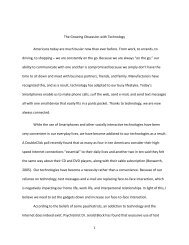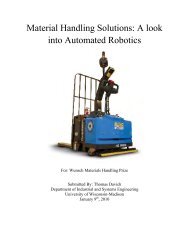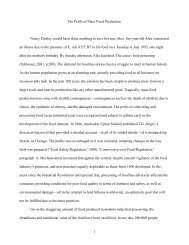An Old Friend In three days, my grandmother will turn 84 years old ...
An Old Friend In three days, my grandmother will turn 84 years old ...
An Old Friend In three days, my grandmother will turn 84 years old ...
You also want an ePaper? Increase the reach of your titles
YUMPU automatically turns print PDFs into web optimized ePapers that Google loves.
<strong>An</strong> <strong>Old</strong> <strong>Friend</strong><br />
<strong>In</strong> <strong>three</strong> <strong>days</strong>, <strong>my</strong> <strong>grandmother</strong> <strong>will</strong> <strong>turn</strong> <strong>84</strong> <strong>years</strong> <strong>old</strong>. <strong>In</strong> the winter of her life, she<br />
doesn’t fear death, or deny it. She is able to talk calmly about the end of her life, and, incredibly,<br />
life beyond her own existence. To me, this blatant acknowledgment of the unknown is<br />
incredibly courageous and unbelievable. For many <strong>years</strong>, <strong>my</strong> grandma has had this passive view<br />
of death, simply seeing it as an inevitable part of life. I have always heard her words, but never<br />
truly accepted the fact that, someday, she <strong>will</strong> be gone. She was in good health up until recently;<br />
a few months ago, she started experiencing small strokes. As <strong>my</strong> mom t<strong>old</strong> me this news over<br />
the phone, she didn’t sound panicked or surprised; the poignant words “Grandma is just getting<br />
<strong>old</strong>er” said it all. <strong>In</strong> <strong>my</strong> 18 <strong>years</strong>, I have never lost a close family member.<br />
I recently had an interesting conversation with <strong>my</strong> friends about nightmares. As <strong>my</strong><br />
friends shared funny and frightening stories about monsters, disasters, and terror, I realized that<br />
all of <strong>my</strong> worst dreams were not action-packed or fantastical. The dreams that left me in a c<strong>old</strong><br />
sweat with a pounding heart are all centered on death. Dreams of <strong>my</strong> father dying in a car crash,<br />
<strong>my</strong> sister being murdered, disease taking the life of <strong>my</strong> best friend, even <strong>my</strong> grandma sitting me<br />
in her lap to tell me she has cancer--all have haunted <strong>my</strong> subconscious. The only recurring<br />
dream I have experienced was watching <strong>my</strong> mother die, with me helpless to save her. Recently,<br />
I had a dream that chronicled <strong>my</strong> own death. <strong>In</strong> <strong>my</strong> dream, <strong>my</strong> death was simple; I chose to take<br />
care of <strong>my</strong> friend as she died from disease, with the knowledge that I would, in <strong>turn</strong>, die of the<br />
same disease. After her death, I slowly felt <strong>my</strong> own body weaken; in the dream, I spent <strong>my</strong> last<br />
moments telling loved ones all of the things I wished I had done with <strong>my</strong> life. When I woke up<br />
1
from the dream, I never felt so happy to be alive and healthy. I also realized that, if I died the<br />
next day, I would not be able to face death courageously like <strong>my</strong> grandma; I would spend <strong>my</strong> last<br />
moments in a panic about what could have been. If I have learned anything from <strong>my</strong> nightmares,<br />
it is that death scares the hell out of me. I am not nearly prepared for the inevitable.<br />
I suppose I am not the only young person who is afraid of death. The concept is so<br />
incomprehensible and seems so far away that it is easiest just to push it out of mind. After all,<br />
procrastination is what we teenagers do best. I <strong>my</strong>self am guilty of pushing the thought of death<br />
aside; the idea is often too overwhelming to handle. However, recent events have caused me to<br />
think about death, and in <strong>turn</strong>, <strong>my</strong> life. When people are asked what they would do if they had<br />
one month to live, common answers include travelling, repairing broken relationships, or saying<br />
goodbye to loved ones. These all seem like fine answers to me, but when I asked <strong>my</strong>self the<br />
same question, I realized that none of these answers would make me feel content with <strong>my</strong> life.<br />
The problem with these answers is that they all seem frantic; they all involve one last month of<br />
quickly tying together broken strings, and a lifetime filled with loose ends. I realized that I want<br />
to live a life with everything tied together; if I die tomorrow, I want to say that I have no regrets.<br />
I <strong>will</strong> not pretend that I know the key to happiness and satisfaction in life. I believe that<br />
the answer is different for everyone, and the journey to finding it is highly personal. The only<br />
problem is a matter of taking the time to find it. It seems that, in our society, a life plan is<br />
handed to us on the day we are born; we are expected to start walking and talking within a few<br />
months of life, ride a bike by age six, just in time to tackle subtraction. As we grow, we are<br />
placed in competition with our peers, with the most athletic, intelligent, and outgoing taking the<br />
prize of attention and validation. By the time we have lived only a quarter of our life, the rest of<br />
2
it has more or less been determined, based on expectations presented to us since the beginning.<br />
Life isn’t left up for interpretation, which is the reason we are all so afraid of death.<br />
Contrary to American mentality, fulfillment is not grounded in a lifetime of competition.<br />
I recently spent two weeks in El Salvador for an implementation trip with Engineers Without<br />
Borders. The trip was <strong>my</strong> first experience outside of the United States and <strong>my</strong> first experience in<br />
a completely different culture. One of the stark differences between the two countries is the use<br />
of time. Hour-long lunch breaks were not considered a waste of time; relaxation and casual<br />
conversation were encouraged. The people of El Salvador are hard-working, but their work is<br />
not their life; they take time to ask questions, learn about each other and from each other,<br />
develop strong family relationships and values, and grow based on their own interests rather than<br />
the interests of society. Their relationships with people are more important than society’s<br />
expectations. They are content with themselves because they have taken the time to know<br />
themselves.<br />
Of course, I cannot assert that the lifestyle of rural El Salvadorians should be the model<br />
for happiness, but they seem to have the right idea. Maybe that’s why <strong>my</strong> Grandma is so<br />
accepting of the eventual end of her life; she has chosen to spend her time building relationships<br />
with others. She <strong>will</strong> leave this world knowing that she <strong>will</strong> be remembered. Her best traits <strong>will</strong><br />
survive through the people who knew her best. As J.K. Rowling wrote in The Tales of the Three<br />
Brothers, “[he] greeted Death as an <strong>old</strong> friend, and went with him gladly, and, as equals, they<br />
departed this life.” <strong>In</strong> the end, we are all just looking for an <strong>old</strong> friend.<br />
3






